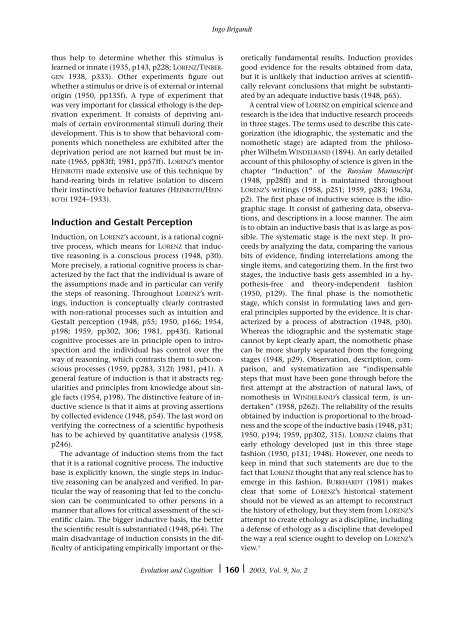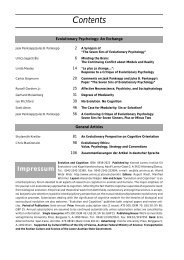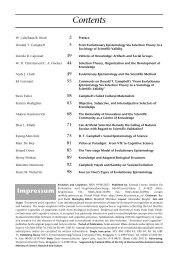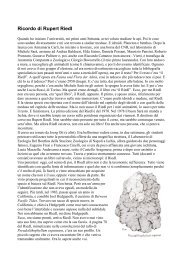Contents - Konrad Lorenz Institute
Contents - Konrad Lorenz Institute
Contents - Konrad Lorenz Institute
You also want an ePaper? Increase the reach of your titles
YUMPU automatically turns print PDFs into web optimized ePapers that Google loves.
Ingo Brigandt<br />
thus help to determine whether this stimulus is<br />
learned or innate (1935, p143, p228; LORENZ/TINBER-<br />
GEN 1938, p333). Other experiments figure out<br />
whether a stimulus or drive is of external or internal<br />
origin (1950, pp135f). A type of experiment that<br />
was very important for classical ethology is the deprivation<br />
experiment. It consists of depriving animals<br />
of certain environmental stimuli during their<br />
development. This is to show that behavioral components<br />
which nonetheless are exhibited after the<br />
deprivation period are not learned but must be innate<br />
(1965, pp83ff; 1981, pp57ff). LORENZ’s mentor<br />
HEINROTH made extensive use of this technique by<br />
hand-rearing birds in relative isolation to discern<br />
their instinctive behavior features (HEINROTH/HEIN-<br />
ROTH 1924–1933).<br />
Induction and Gestalt Perception<br />
Induction, on LORENZ’s account, is a rational cognitive<br />
process, which means for LORENZ that inductive<br />
reasoning is a conscious process (1948, p30).<br />
More precisely, a rational cognitive process is characterized<br />
by the fact that the individual is aware of<br />
the assumptions made and in particular can verify<br />
the steps of reasoning. Throughout LORENZ’s writings,<br />
induction is conceptually clearly contrasted<br />
with non-rational processes such as intuition and<br />
Gestalt perception (1948, p55; 1950, p166; 1954,<br />
p198; 1959, pp302, 306; 1981, pp43f). Rational<br />
cognitive processes are in principle open to introspection<br />
and the individual has control over the<br />
way of reasoning, which contrasts them to subconscious<br />
processes (1959, pp283, 312f; 1981, p41). A<br />
general feature of induction is that it abstracts regularities<br />
and principles from knowledge about single<br />
facts (1954, p198). The distinctive feature of inductive<br />
science is that it aims at proving assertions<br />
by collected evidence (1948, p54). The last word on<br />
verifying the correctness of a scientific hypothesis<br />
has to be achieved by quantitative analysis (1958,<br />
p246).<br />
The advantage of induction stems from the fact<br />
that it is a rational cognitive process. The inductive<br />
base is explicitly known, the single steps in inductive<br />
reasoning can be analyzed and verified. In particular<br />
the way of reasoning that led to the conclusion<br />
can be communicated to other persons in a<br />
manner that allows for critical assessment of the scientific<br />
claim. The bigger inductive basis, the better<br />
the scientific result is substantiated (1948, p64). The<br />
main disadvantage of induction consists in the difficulty<br />
of anticipating empirically important or theoretically<br />
fundamental results. Induction provides<br />
good evidence for the results obtained from data,<br />
but it is unlikely that induction arrives at scientifically<br />
relevant conclusions that might be substantiated<br />
by an adequate inductive basis (1948, p65).<br />
A central view of LORENZ on empirical science and<br />
research is the idea that inductive research proceeds<br />
in three stages. The terms used to describe this categorization<br />
(the idiographic, the systematic and the<br />
nomothetic stage) are adapted from the philosopher<br />
Wilhelm WINDELBAND (1894). An early detailed<br />
account of this philosophy of science is given in the<br />
chapter “Induction” of the Russian Manuscript<br />
(1948, pp28ff) and it is maintained throughout<br />
LORENZ’s writings (1958, p251; 1959, p283; 1963a,<br />
p2). The first phase of inductive science is the idiographic<br />
stage. It consist of gathering data, observations,<br />
and descriptions in a loose manner. The aim<br />
is to obtain an inductive basis that is as large as possible.<br />
The systematic stage is the next step. It proceeds<br />
by analyzing the data, comparing the various<br />
bits of evidence, finding interrelations among the<br />
single items, and categorizing them. In the first two<br />
stages, the inductive basis gets assembled in a hypothesis-free<br />
and theory-independent fashion<br />
(1950, p129). The final phase is the nomothetic<br />
stage, which consist in formulating laws and general<br />
principles supported by the evidence. It is characterized<br />
by a process of abstraction (1948, p30).<br />
Whereas the idiographic and the systematic stage<br />
cannot by kept clearly apart, the nomothetic phase<br />
can be more sharply separated from the foregoing<br />
stages (1948, p29). Observation, description, comparison,<br />
and systematization are “indispensable<br />
steps that must have been gone through before the<br />
first attempt at the abstraction of natural laws, of<br />
nomothesis in WINDELBAND’s classical term, is undertaken”<br />
(1958, p262). The reliability of the results<br />
obtained by induction is proportional to the broadness<br />
and the scope of the inductive basis (1948, p31;<br />
1950, p194; 1959, pp302, 315). LORENZ claims that<br />
early ethology developed just in this three stage<br />
fashion (1950, p131; 1948). However, one needs to<br />
keep in mind that such statements are due to the<br />
fact that LORENZ thought that any real science has to<br />
emerge in this fashion. BURKHARDT (1981) makes<br />
clear that some of LORENZ’s historical statement<br />
should not be viewed as an attempt to reconstruct<br />
the history of ethology, but they stem from LORENZ’s<br />
attempt to create ethology as a discipline, including<br />
a defense of ethology as a discipline that developed<br />
the way a real science ought to develop on LORENZ’s<br />
view. 3<br />
Evolution and Cognition ❘ 160 ❘ 2003, Vol. 9, No. 2








